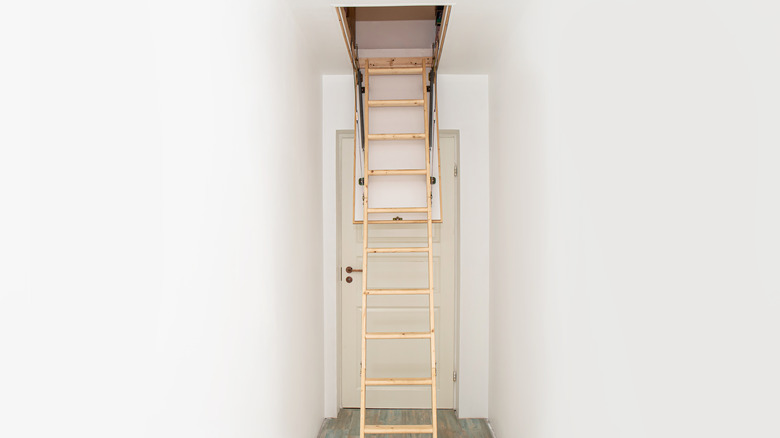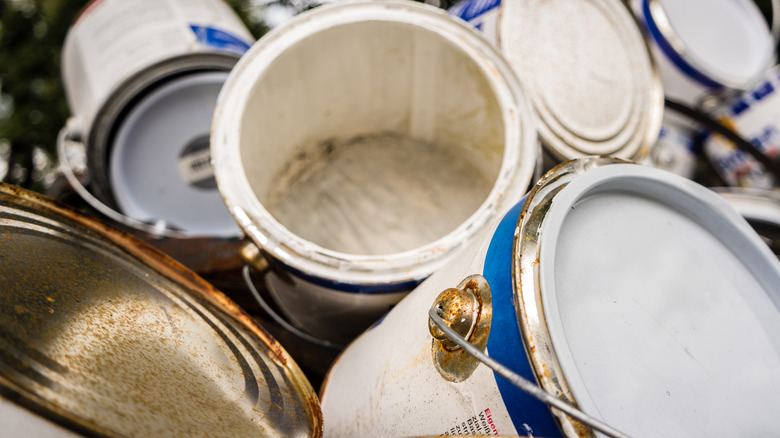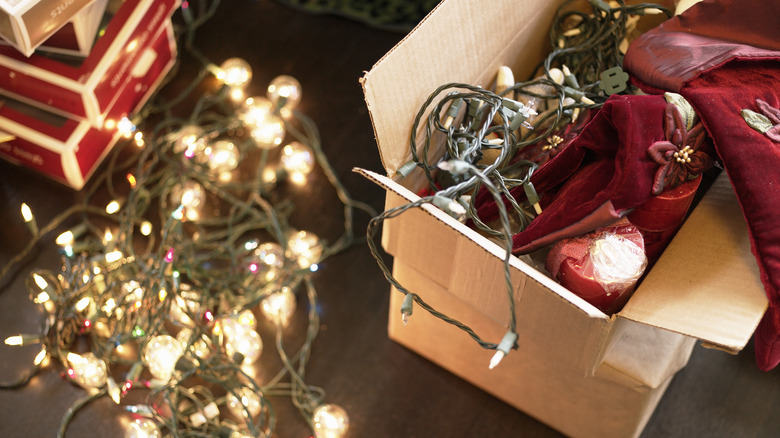Give These Items More Life By Keeping Them Out Of Your Attic
Your attic may seem like the perfect place to store lots of stuff, but there are some things that will do better in a more controlled climate. Attics are stuffy places that we generally don't spend a lot of time in — they aren't connected to the home's heating or cooling systems unless they've been updated for living purposes. Most often, on a hot day, your attic will be smoldering, and on a cold day, it will feel like an ice chest. Those definitely aren't the greatest conditions for any items that need to either stay cool, warm, or somewhere in between.
Attics tend to not be the cleanliest places either –- leaving your precious heirlooms and collectibles to potentially be covered in dust and mold. You may have grandma's hand-sewn linens in storage for eternity then decide you want to use them — if they've been in the attic they may be a stinky, musty, moldy, gross mess that may or may not be salvageable. So, before you put anything up in the out-of-the-way attic space, consider some of the items that you shouldn't store up there if you want them to have a long life.
1. Movie and music
If you're not ready to let go of CDs and DVDs yet, or you're a vintage collector of vinyl, cassettes, and VHS tapes, do not store them in the attic. Those unregulated temperatures can warp your vinyl and make cassettes and VHS tapes completely unplayable. And, while you might think those sturdy DVD and CD disks are safe, you'd be wrong. Regular temperature fluctuations can make your discs become more brittle and more susceptible to breakage when it comes time to watch your favorite films or listen to your favorite old-school tunes again. You also shouldn't put your video games, no matter the format, in the attic for the same reasons.
If you can't let go of offline entertainment, you're better off storing these items safely in a closet or renting a temperature-controlled storage unit. You also want to store them in a plastic bin instead of boxes — boxes can absorb moisture out of the air, so on an especially humid day you could be growing mold on your prized VHS collection.
2. Books
Ah, the tomes that teach us and take us to new worlds -– what will the attic do to those? Whether you're a fan of a specific author, refuse to let go of your college books, or are saving your favorite children's books to hand off to your grandchildren, there isn't always enough bookshelf space for your entire collection of books. It's common to keep some for nostalgia's sake and prefer to put them out of sight, leaving room on the shelves for the books we've yet to read. That out-of-sight spot shouldn't be the attic.
Books need a dry environment, which means one that isn't likely to get a lot of humidity. They should also be somewhere that is cool, a room or space that doesn't get too hot in the summer or from the furnace in the winter. Unless your attic is temperature controlled, it does not meet the requirements. Neither does your basement. Not only does the wrong environment cause yellowing of your books' pages, but it can make them brittle too. Moisture could also attract bugs that will make a home and nest of your books. Again skip storing them in cardboard boxes. Instead, consider packing them in a wood crate or plastic storage bin and keep them in a closet.
3. Any kind of papers
Papers, just like books, will yellow and get brittle in the wrong atmosphere. Whether it's years of tax documents or some old manuscript you wrote, the attic is not the right place for these paper products either. If you risk the chance of being audited (and we all do, really), you want those tax documents in tip-top shape. Plus, too many heavy objects (like lots of boxes of books and papers), can cause sagging issues in your home.
Most people store their important documents in cardboard file boxes, and as long as you're keeping them in a temperature-controlled space, like your office closet. If you have the space in a room for filing cabinets, you can organize them that way as well. Just keep them out of the attic no matter what you're putting them in!
4. Leather furniture
Whether it's a vintage piece that's been in your family a while or something new, the atmosphere of an attic is the perfect place to destroy anything leather — but we can't always fit all of our furniture in our living spaces. You want to keep your leather furniture in an area that doesn't struggle with humidity, which can cause mold to grow.
On the other hand, you don't want it to be in a space that is too dry too often, which can also damage your leather. So, where can you put your leather heirlooms to safely store them? Well, your best bet for leather furniture storage is wrapping it in something soft (no plastic) and keeping it in a temperature-controlled storage unit.
5. Grandma's quilt and other linens
Leather isn't the only fabric that can be ruined by being stored in the attic where humidity is a common thing. If you have a collection of linens that have been in your family for decades or a quilt that was made by someone special, a wooden chest in the attic is not the right place to store it.
You may not be using those vintage linens passed down through your family, but you don't want to put them in the attic where they are likely to get moldy and musty — two things that may not wash out of them. Plus, attics are notorious for being home to things like mice, which enjoy making nests in cozy fabrics. Skip the boxes, wood or cardboard, and even plastic bags. Be careful to safely store your quilts and other linens where they're not only free from possible moisture, but away from dust as well. Archival boxes are the safest bet.
6. Wood furniture
For some, a vision of an old attic always comes with a wood storage chest full of family heirlooms like your great-grandmother's wedding dress or those linens we just spoke about -– but attics are not safe for wood furniture and other things made of wood unless you prepare them for safekeeping. You may be better off storing your wood furniture in a spare room where the temperature is stable, or in a climate-controlled storage unit.
If you have to keep them in the attic, it's probably a better choice than the basement. However, that muggy attic can damage wood that hasn't been sealed or well taken care of. And, if it's too dry, just like with leather furniture, the dry air can also dry out the wood. If you have to store something wood in the attic, be sure to safely wrap it in cloth or plastic to protect it. You may also want to invest in a humidifier if your attic leans on the dry side or a dehumidifier for muggier months.
7. Flammable products
While it may not be the first thing that pops in your head when you think of house fire causes, it is reported that at least 10,000 house fires a year start in the attic. While the causes of these fires tend to be electrical or natural (think lightning striking your home), having flammable liquids in your attic increases the chance of a fire spreading more quickly.
A few of these things include leftover paints and household cleaners. While it might seem a nice out-of-the-way place to tuck away that extra paint, you'd be better off storing it in a shed or in the basement — this also includes anything you use for cleaning up paint, like turpentine. Cleaning products will also fare better in the basement. You may also want to keep them organized under the kitchen and bathroom sinks so they're easy to get to when you need to do some cleaning.
8. Carboard boxes
Cardboard boxes can also add to the fire risk, since they're essentially just kindling. If there are some items you need to store in the attic, you're better off using plastic storage bins (which will better help keep bugs and other pests out). Cardboard also absorbs moisture, so a muggy attic will quickly lead to soggy and musty boxes. The boxes will also start to degrade over time and you could find yourself hauling a box down the attic stairs that falls apart and dumps all the contents everywhere.
Even if you're only storing empty storage boxes in the attic, it's still a bad idea. If you're planning a move and want to save boxes, store them in the garage. Boxes attract bugs, especially spiders, so unless you want more bugs moving in, you'll want to keep the boxes elsewhere.
9. Musical instruments
Not all instruments are used and played regularly — even musicians tend to collect extra guitars, amps, microphones, and more. It's hard to let go of an old guitar that's been with you through a lot of gigs, but there isn't always space to keep it around — the attic is not the place for it. It's not even the place for that old organ or your keyboard that you haven't touched since high school. If you're not ready to get rid of your old instruments, the muggy attic is not a good place. From the potential for rusty strings to dust in places it shouldn't be, and the fact that mice will be happy to make a home in guitars and even pianos, you're better off finding another storage spot.
Your instruments deserve a home in a well-ventilated and temperature-controlled part of your home. Hang guitars in a spare room and move other pieces into space where they can be used as decor.
10. Electronics
Electronics have no place in the attic, or the basement for that matter (unless they're remodeled as living spaces with proper heating and air conditioning). The ever-changing temperatures of the attic, especially the heat, will damage electronics enough to make them never work again. The biggest culprit: condensation. Rapid changes in temperature and humidity can cause a buildup of moisture inside the equipment, eventually ruining it completely.
Storage units are an OK choice for storing these items, if you opt for the temperature-controlled version. Your electronics need to be in an area where humidity is not going to be an issue. It's also best to store electronics in their original packaging and to remove any removable cords from them to help protect wiring. If you don't have the original boxes anymore, be sure to safely package items by packing them securely in plastic bins.
11. Holiday decorations
Some holiday decor is sturdy and seems to last forever no matter where you keep it, but some older vintage or delicate pieces can be damaged when stored in the attic. If you've noticed old paper Halloween decor getting brittle or your Christmas tree smelling musty, it could be the fault of your moist attic. The moisture from humidity can damage Christmas lights and other light-up pieces as well. Stocking and Santa hats make great beds for pests as well, especially if you're storing your holiday decor in cardboard boxes.
No matter where in your home you are storing your ornaments and other holiday pieces, keep them in plastic storage containers for extra safety. This will help keep pests out and give your holiday decor a sturdier home until that holiday rolls around again. Wrapping them nicely in bubble wrap or tissue paper will give them extra protection as well.
12. Anything made of wax
There's nothing wrong with stocking up on candles, whether you need them for power outages, love the ambiance, or you have some spells to cast! However, you need to be careful of where you're keeping those melty wax wonders if you don't want them to become a mess. Cold spaces are great for candles, where they can stay nice and firm. In fact, in candlemaking, putting the wax molds in the freezer once they're filled helps harden the candles faster.
While attics can sometimes be chilly places, during the winter months anyway, they are most often hotter spaces the rest of the year, and candles are meant to melt in extreme heat. If you have old wax figurine candles that you've been collecting, the attic is also a bad place for them. Luckily, candles can be easily stored in a spare drawer somewhere away from any furnace vents in other parts of your home and can often fare well in the basement.
13. Art collections
Love your art collection but it's becoming too much to keep it all up all year round? If you're a collector, there is a good chance that you sometimes want to store some pieces away while others get the limelight. Where you put all of these pieces is important to their lifespan.
Much like many of the items on this list, artwork cannot withstand too much moisture or too much dryness. Dry air will make canvases brittle and could cause paint to start to chip away. Moisture, again, can cause mold and mildew, which is not good for art. You also want to be careful about keeping your art in direct sunlight (like attic windows) or where leaks could become an issue because water damage will absolutely ruin a painting. You're better off storing your art in a closet rather than an attic or basement. Store the pieces standing, and possibly covered with archival paper for extra protection from dust.













